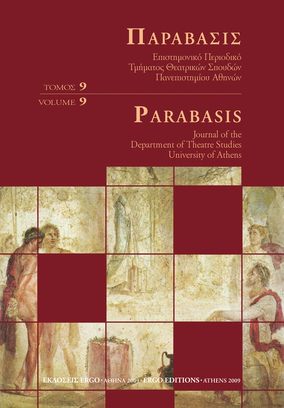Μετάφραση σημαίνει ανάγνωση : λόγος που εκφώνησε η Françoise Wuilmart, διευθύντρια του Κολλεγίου του Seneffe, κατά την καταληκτήρια συνεδρία του θερινού προγράμματος 2000
Part of : Παράβασις : επιστημονικό περιοδικό Τμήματος Θεατρικών Σπουδών Πανεπιστημίου Αθηνών ; Vol.4, No.1, 2002, pages 81-86
Issue:
Pages:
81-86
Parallel Title:
Translation means reading
Section Title:
Μελέτες και άρθρα
Author:
Abstract:
Translation means, first of all, reading. The process of translating includes two distinct phases: “impregnation” and “rendering”. As far as “rendering” is concerned, literary criticism has attempted several approaches, focusing on whether or not the translator is a “traitor” of the original text. As a matter of fact, this is a false problem, since translating always implies not only a transposition of the text from its own language to another, but also a transplantation from its cultural environment to another. Differences in readers belonging to dissimilar countries, between traditional modes of expression, divergence between visions of the world, as well as lack of equivalence in some “rich” (or “weak”) aspects of the languages used by the translator, make this task extremely difficult, because the translator elaborates a really new text with materials and tools which are not those of the original. So, a translation is a “re-writing”, in a way.The first moment of the process we are talking about, has been more or less neglected by the critics. “Impregnation” means diving deeply in the text itself, decoding-if possible- all its messages and connotations and proceeding in a textual and intertextual analysis based on objective reading. From this point of view, collaboration between author and translator may prove very dangerous for the translated text, because the translator could deviate to a subjective evaluation of the literary work, or the author could desire to intervene in a work he does not possess (anymore, apd whose linguistic and cultural, .keys would be strange to him.The translator must follow his master-author with respect, loyalty and attention, while, at the same time, he must keep his intellectual and linguistic flexibility, which allow him to build a stable bridge between the original text and the public of his own country.
Subject:
Subject (LC):
Notes:
H Françoise Wuilmart γεννήθηκε ατη Φραμερί του Βελγίου, το 1942. Σπούδασε Γερμανική Φιλολογία στη Φιλοσοφική Σχολή του Ελεύθερου Πανεπιστημίου των Βρυξελλών (U.L.B.), από όπου, στη συνέχεια, έλαβε τον τίτλο της «Επιστημονικής και Επαγγελματικής Αναγνώρισης» (ισότιμο με τον διδακτορικό) για τη γραπτή και προφορική διάδοση της σκέψης του μεγάλου Γερμανού στοχαστή Ernst Bloch στον γαλλόφωνο κόσμο. Είναι ιδρύτρια και διευθύντρια του μεταπτυχιακού τμήματος του Ευρωπαϊκού Κέντρου Λογοτεχνικής Μετάφρασης (C.E.T.L.), καθώς και του Ευρωπαϊκού Κολλεγίου Λογοτεχνικής Μετάφρασης του Seneffe. Διδάσκει μετάφραση (Γερμανική/Γαλλική) στο Ανώτατο Ινστιτούτο Μεταφραστών και Διερμηνέων της Γαλλικής Κοινότητας (I.S.T.I.). Είναι επίτιμο μέλος της «Ένωσης για την εξακτίνωση των ευρωπαϊκών γλωσσών» και του Pen Club. Έχει μεταφράσει 1) πολυάριθμα δοκίμια για την τέχνη, την ψυχολογία και την ψυχανάλυση, λιμπρέτα όπερας και καλλιτεχνικούς καταλόγους, 2) το τρίτομο (2.000 σελίδων) έργο του Ernst Bloch με τον τίτλο Η αρχή της προσδοκίας, 3) έργα των F. C. Delius και Jean Améry. Επίσης, έχει γράψει πολλά άρθρα και δοκίμια για τη λογοτεχνική μετάφραση και για τους συγγραφείς που έχει η ίδια μεταφράσει. Της έχουν απονεμηθεί το «Βραβείο Ernst Bloch» (1991), το ευρωπαϊκό βραβείο «Αριστείον» για την καλύτερη λογοτεχνική μετάφραση (1993) και το «Βραβείο Gérard de Nerval» (1996).




